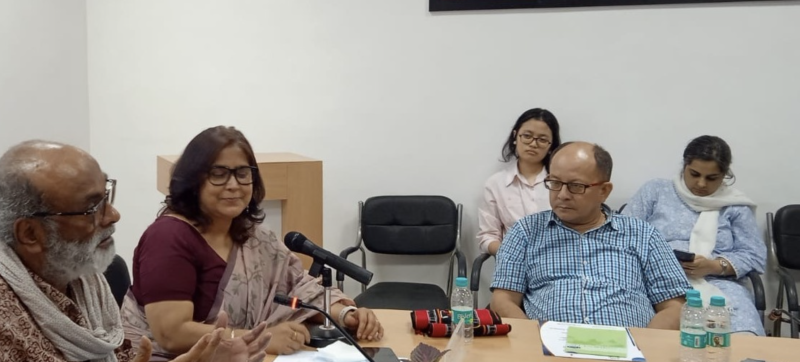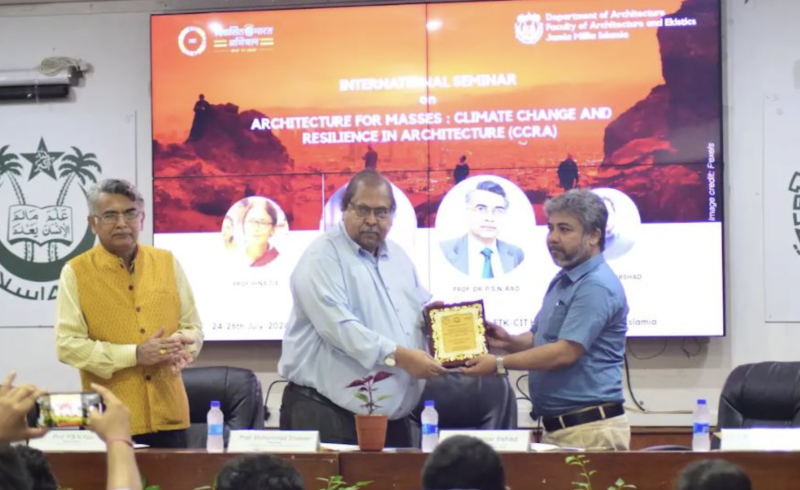New Delhi, July 25:The Centre for Northeast Studies and Policy Research (CNESPR), Jamia Millia Islamia (JMI) organized a two-day National Seminar on "Land, Development and Identity Politics in Northeast India" on 23rd and 24th July 2024, sponsored by the Indian Council of Social Science Research (ICSSR). The aim of the seminar was to address pertinent themes confronting Northeast India and invoke new thinking about the complex interplay between land, development, and identity in the region, and the paper presenters were from the eight states of North East India and Kolkata, Bangalore, Hyderabad and Delhi.
The seminar began with a welcome address and introduction of the theme by Prof. Manisha Tripathy Pandey, Honorary Director, CNESPR, JMI, who emphasized the intrinsic link between land, identity, and development in the Northeast. Prof. Mohammad Shakeel, Officiating Vice Chancellor of JMI, inaugurated the seminar as the Chief Guest recognizing the diversity of the region and emphasizing the importance of academic discourse in addressing regional challenges. Prof. Mohd. Muslim Khan, Dean of the Faculty of Social Sciences, graced the occasion as the Guest of Honor and shed light upon the essence of Northeast India being home to numerous ethnic groups characterized by cultural diversity and heterogeneity yet united in spirit.
Eminent scholar Prof. Virginius Xaxa delivered a thought-provoking keynote address, setting the tone for the discussions that followed. He discussed the politico-administrative structure of the Northeast, stressing the importance of historical context in understanding identity politics. He noted how the region, despite its creation based on the segmentation of Assam, has come to be viewed as a unified whole. Prof. Amarjeet Singh gave the vote of thanks for the inaugural session.
The seminar featured six academic sessions over two days, with over 25 scholars presenting papers on various aspects of land issues in Northeast India. The first day focused on "Trends in Land Use and its Impact," "Development Projects," and "Infrastructure and Land, State's Policy on Land." The second day explored "Inter-State Border Disputes and Identity," "Customary Laws, Land and Identity," and concluded with a session on "Land and Gender." Presentations covered a wide range of topics, including the protection of indigenous land rights under the Sixth Schedule and Article 371, socio-cultural implications of development projects on indigenous communities, land appropriation and inequalities among various tribes, the complexities of inter-state border disputes, and the changing dynamics of women's land rights in different ethnic contexts across the region. Each session was followed by interactive discussions with questions posed by scholars and faculty members. The seminar was attended by faculty members, research scholars, and students from various departments of the university, as well as participants from other institutions from different parts of India.
The seminar concluded with a valedictory session chaired by Prof. Manisha T. Pandey. Prof. Savyasaachi (Retd.), eminent scholar and anthropologist, delivered the valedictory address. He argued that land is a three-dimensional entity and is the basis of interrogating identity politics. He emphasised that viewing land merely as a two-dimensional property is limiting. This restricted view can lead individuals to become two-dimensional themselves, unable to grasp fundamental questions about “what is my identity and who am I in relation to land”. He put forth five levels of identity and asserted that the observer and observed must engage as equals without the observer trying to fix the observed. Dr. K. Kokho, Assistant Professor at CNESPR, JMI delivered the vote of thanks.
The seminar brought together the warring ethnic communities in the Northeast India on one academic platform by discussing complex land and identity issues and suggesting the way forward for a dialogue between war and peace. It proved to be a stimulating, productive, and enriching experience for all participants, contributing to a more comprehensive understanding of land issues in Northeast India.


